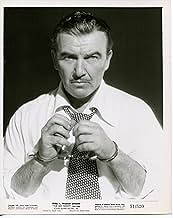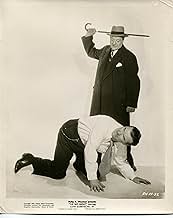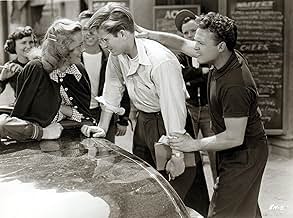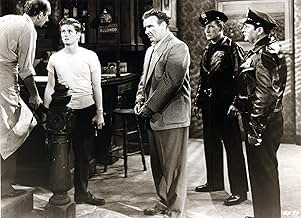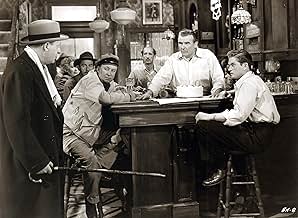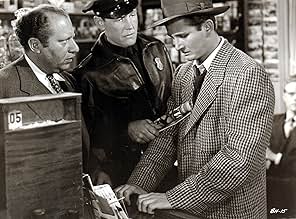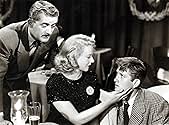AVALIAÇÃO DA IMDb
6,3/10
1,3 mil
SUA AVALIAÇÃO
Adicionar um enredo no seu idiomaA teenager comes of age while seeking revenge on the man who beat up his father.A teenager comes of age while seeking revenge on the man who beat up his father.A teenager comes of age while seeking revenge on the man who beat up his father.
- Direção
- Roteiristas
- Artistas
John Drew Barrymore
- George La Main
- (as John Barrymore Jr.)
Howland Chamberlain
- Flanagan
- (as Howland Chamberlin)
Emile Meyer
- Peckinpaugh
- (as Emil Meyer)
Mauri Leighton
- Terry Angelus
- (as Mauri Lynn)
Robert Aldrich
- Ringsider at Fight
- (não creditado)
Walter Bacon
- Boxing Match Spectator
- (não creditado)
Benjie Bancroft
- Bar Patron
- (não creditado)
Robert Bice
- Taxi Driver
- (não creditado)
Willie Bloom
- Boxing Match Spectator
- (não creditado)
Chet Brandenburg
- Boxing Match Spectator
- (não creditado)
Lane Chandler
- Printer
- (não creditado)
Edmund Cobb
- Cop
- (não creditado)
Avaliações em destaque
The story here is revenge, more real-life based, a 1950's version of the crime of passion. A teenager's good-hearted father is beaten to a pulp by a gangster, so the kid invades the streets to get some payback. The father's not worried about the floor-wiping, which leads to a mystery behind the teen's mother, who skipped out on the family long ago, and a woman the father knows who has committed suicide.
Seeing this film, there's not much in terms of plot, but there are some notable scenes, particularly when the kid hears a beautiful night-club singer, becomes entranced, gets a chance to meet her on the street, and tells her how beautiful she is. Even though she's, you know,
black. The pain in the singer's face rends the poor kid, who was transported by her voice, but can't get beyond her skin color.
This film also has one of THE great lines ever in any film noir or any movie period, at least concerning the tragedy between a man and a woman, when there is love involved. There are no words more powerful or poignant, especially for a man who loves a woman beyond reason, who knows he has lost the love of his life. Unable to move on, to love or marry another woman after that one woman has destroyed him, and in fact still very much in love with his destroyer,
Preston Foster tells his son, "Sometimes a man loves one woman in the whole world. If she turns out to be the wrong one, well...that's just tough." Truly, the heart of noir is not blackness, but the white-hot scars of passion.
Seeing this film, there's not much in terms of plot, but there are some notable scenes, particularly when the kid hears a beautiful night-club singer, becomes entranced, gets a chance to meet her on the street, and tells her how beautiful she is. Even though she's, you know,
black. The pain in the singer's face rends the poor kid, who was transported by her voice, but can't get beyond her skin color.
This film also has one of THE great lines ever in any film noir or any movie period, at least concerning the tragedy between a man and a woman, when there is love involved. There are no words more powerful or poignant, especially for a man who loves a woman beyond reason, who knows he has lost the love of his life. Unable to move on, to love or marry another woman after that one woman has destroyed him, and in fact still very much in love with his destroyer,
Preston Foster tells his son, "Sometimes a man loves one woman in the whole world. If she turns out to be the wrong one, well...that's just tough." Truly, the heart of noir is not blackness, but the white-hot scars of passion.
From Losey's American feature films (a period which barely lasted four years, when he fell victim to political persecution) I had only previously watched his eccentric debut, THE BOY WITH GREEN HAIR (1948). The same year he made THE BIG NIGHT, a low-budget noir, he directed two other thrillers - THE PROWLER, Losey's own favorite from this early phase of his career and M, an Americanization of Fritz Lang's German masterpiece. Both these films promise to be a good deal more interesting than the ones I watched, and I hope I get the chance to view them someday...
Anyway, back to THE BIG NIGHT: in itself, it wasn't too bad but it didn't feel at all like a Losey film; perhaps that's because I'm not used to watching him dealing with an American setting - but it's still a minor film, not quite knowing where it's going and not even that compelling while it's on. The noir-ish atmosphere (courtesy of cinematographer Hal Mohr), however, is quite interestingly deployed - sometimes with an audacious psychological resonance, as in the nightclub scene where a riotous drum solo brings back to lead John Barrymore Jr. (looking more like Sean Penn than his matinée' idol father!) memories of his father's vicious beating at the hands of a crippled but influential sports columnist (an effectively sinister Howard St. John); the latter episode is actually a key scene, which sets the plot in motion and sends Barrymore - who witnessed father Preston Foster's humiliation and whom he idolized - seething with revenge in search of St. John.
The characters are largely stereotypes - caring bartender (Foster owns a bar), philosophical drunk pal, his bitter girlfriend (a rather spent Dorothy Comingore, who 10 years earlier had played Susan Alexander in CITIZEN KANE [1941]!), her good-girl sister who falls for and yearns to 'save' Barrymore, shady promoter Emil Meyer (a dry run for his memorable turn as a crooked cop in SWEET SMELL OF SUCCESS [1957]), etc. - but the last act provides a couple of ironic twists involving the characters of Foster, St. John and the tragic fate of a woman they both loved in their own way.
Anyway, back to THE BIG NIGHT: in itself, it wasn't too bad but it didn't feel at all like a Losey film; perhaps that's because I'm not used to watching him dealing with an American setting - but it's still a minor film, not quite knowing where it's going and not even that compelling while it's on. The noir-ish atmosphere (courtesy of cinematographer Hal Mohr), however, is quite interestingly deployed - sometimes with an audacious psychological resonance, as in the nightclub scene where a riotous drum solo brings back to lead John Barrymore Jr. (looking more like Sean Penn than his matinée' idol father!) memories of his father's vicious beating at the hands of a crippled but influential sports columnist (an effectively sinister Howard St. John); the latter episode is actually a key scene, which sets the plot in motion and sends Barrymore - who witnessed father Preston Foster's humiliation and whom he idolized - seething with revenge in search of St. John.
The characters are largely stereotypes - caring bartender (Foster owns a bar), philosophical drunk pal, his bitter girlfriend (a rather spent Dorothy Comingore, who 10 years earlier had played Susan Alexander in CITIZEN KANE [1941]!), her good-girl sister who falls for and yearns to 'save' Barrymore, shady promoter Emil Meyer (a dry run for his memorable turn as a crooked cop in SWEET SMELL OF SUCCESS [1957]), etc. - but the last act provides a couple of ironic twists involving the characters of Foster, St. John and the tragic fate of a woman they both loved in their own way.
As someone who knew John Barrymore Jr. 25 years ago, I was heartbroken to see him early in his aborted film career. Though not as charismatic as James Dean would be just a couple of years later, he was certainly Dean's prototype in The Big Night. Perhaps with a better film and a less disturbed personality, Barrymore might have been a working Hollywood actor for many years to come. Anyway, what director Joseph Losey lacked here was the Los Angeles cityscape he used to full effect that same year in his retelling of Fritz Lang's M. The Big Night was screaming for a location project on downtown L.A.'s seedy, beaten down Bunker Hill, a neighborhood of crumbling Victorian mansions and apartment buildings with vertiginous stairways that provided so much atmosphere to other films, such as Kiss Me Deadly, Criss-Cross, The Exiles and, yes, M. Instead, the movie is stage bound and hemmed in by sets that never look convincing. With its rambling "a night in the life" plot line, The Big Night needed another character: a dark city of real streets, background lights, rambling old house, and dingy clubs and bars. In other words, the kind of verisimilitude that transports the viewer into the protagonist's world. The back lot, unfortunately, was a poor stand-in.
Lots of accused Communists involved in this film, and one spy!
Yes - John Barrymore Jr. Was paid and given an expense account to spy on poor Joseph Losey, the director. Barrymore later confessed to Losey, who forgave him, and the two enjoyed fabulous meals on Barrymore's FBI expense account.
George La Main (John Drew Barrymore) is Georgie, who watches his father caned and beaten brutally by a sportswriter, Al Judge. We don't know why, just that he takes it.
Georgie, only 17, is traumatized and wants revenge. This quest takes him to a prize fight, nightclubs, and apartments in walk-ups in the seedier parts of Los Angeles as apropos the noir atmosphere. What Georgie learns will take him out of his youth. It's disillusioning but it's reality, like it or not.
This is Losey's last film before blacklisting causes him to leave the country. The role of Georgie is a James Dean-type role. Georgie is portrayed as kind of a dork though Barrymore was better looking than this. He does a good job as the tortured young man.
Preston Foster, Howard St. John, Joan Lorring, and Dorothy Comingore (in her last role) provide good support.
In the end, the film, though uneven, shows that secrets and lies can hurt, and people can betray and disappoint you; sadly, it's all part of life's tapestry.
Certainly no one knew that better than Losey, the ruined Comingore, uncredited writers Lardner and Butler, and actor Howard Chamberlin, all part of this film and blacklisted.
Yes - John Barrymore Jr. Was paid and given an expense account to spy on poor Joseph Losey, the director. Barrymore later confessed to Losey, who forgave him, and the two enjoyed fabulous meals on Barrymore's FBI expense account.
George La Main (John Drew Barrymore) is Georgie, who watches his father caned and beaten brutally by a sportswriter, Al Judge. We don't know why, just that he takes it.
Georgie, only 17, is traumatized and wants revenge. This quest takes him to a prize fight, nightclubs, and apartments in walk-ups in the seedier parts of Los Angeles as apropos the noir atmosphere. What Georgie learns will take him out of his youth. It's disillusioning but it's reality, like it or not.
This is Losey's last film before blacklisting causes him to leave the country. The role of Georgie is a James Dean-type role. Georgie is portrayed as kind of a dork though Barrymore was better looking than this. He does a good job as the tortured young man.
Preston Foster, Howard St. John, Joan Lorring, and Dorothy Comingore (in her last role) provide good support.
In the end, the film, though uneven, shows that secrets and lies can hurt, and people can betray and disappoint you; sadly, it's all part of life's tapestry.
Certainly no one knew that better than Losey, the ruined Comingore, uncredited writers Lardner and Butler, and actor Howard Chamberlin, all part of this film and blacklisted.
As previous reviewer wrote, saw this on TCM and the sound was terrible. Good story in need of a cleanup. I like hearing dialogue.
Você sabia?
- CuriosidadesAccording to interviews that director Joseph Losey gave in the mid-1970s to Michel Ciment, the FBI wanted to spy on him in Europe, where he relocated to work after being blacklisted by Hollywood because of his political activities. So they paid John Drew Barrymore (who became a good friend after this movie) to furnish information about Losey's political activities, if any, in London. Barrymore later met Losey in London and confessed to him about the money and expense account the FBI had given him to spy on Losey. Losey, recalling that the young actor had been under tremendous pressure at the time, forgave him and, in fact, suggested that they have several lavish meals together and put the cost on Barrymore's FBI expense account, which they promptly did.
- Erros de gravaçãoThe magazine racks outside the corner store are mostly issues contemporary to 1951, with one glaring exception. A copy of the famous first issue of The New Yorker (published in 1925).
- Citações
Peckinpaugh: Next time you see somebody drop money, don't think about it so long before you decide to give it back.
- ConexõesFeatured in Vampira: The Big Night 1951 (1956)
Principais escolhas
Faça login para avaliar e ver a lista de recomendações personalizadas
- How long is The Big Night?Fornecido pela Alexa
Detalhes
- Data de lançamento
- País de origem
- Idioma
- Também conhecido como
- The Big Night
- Locações de filme
- 218 East 12th Street, Downtown, Los Angeles, Califórnia, EUA(George goes to the old St. Joseph's Church - destroyed by fire and demolished in 1983)
- Empresa de produção
- Consulte mais créditos da empresa na IMDbPro
- Tempo de duração
- 1 h 15 min(75 min)
- Cor
- Proporção
- 1.37 : 1
Contribua para esta página
Sugerir uma alteração ou adicionar conteúdo ausente



